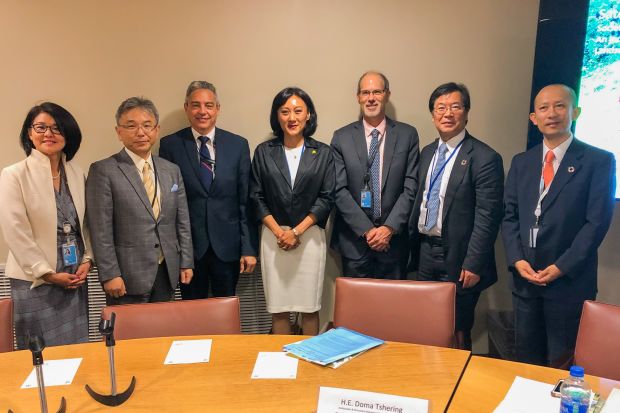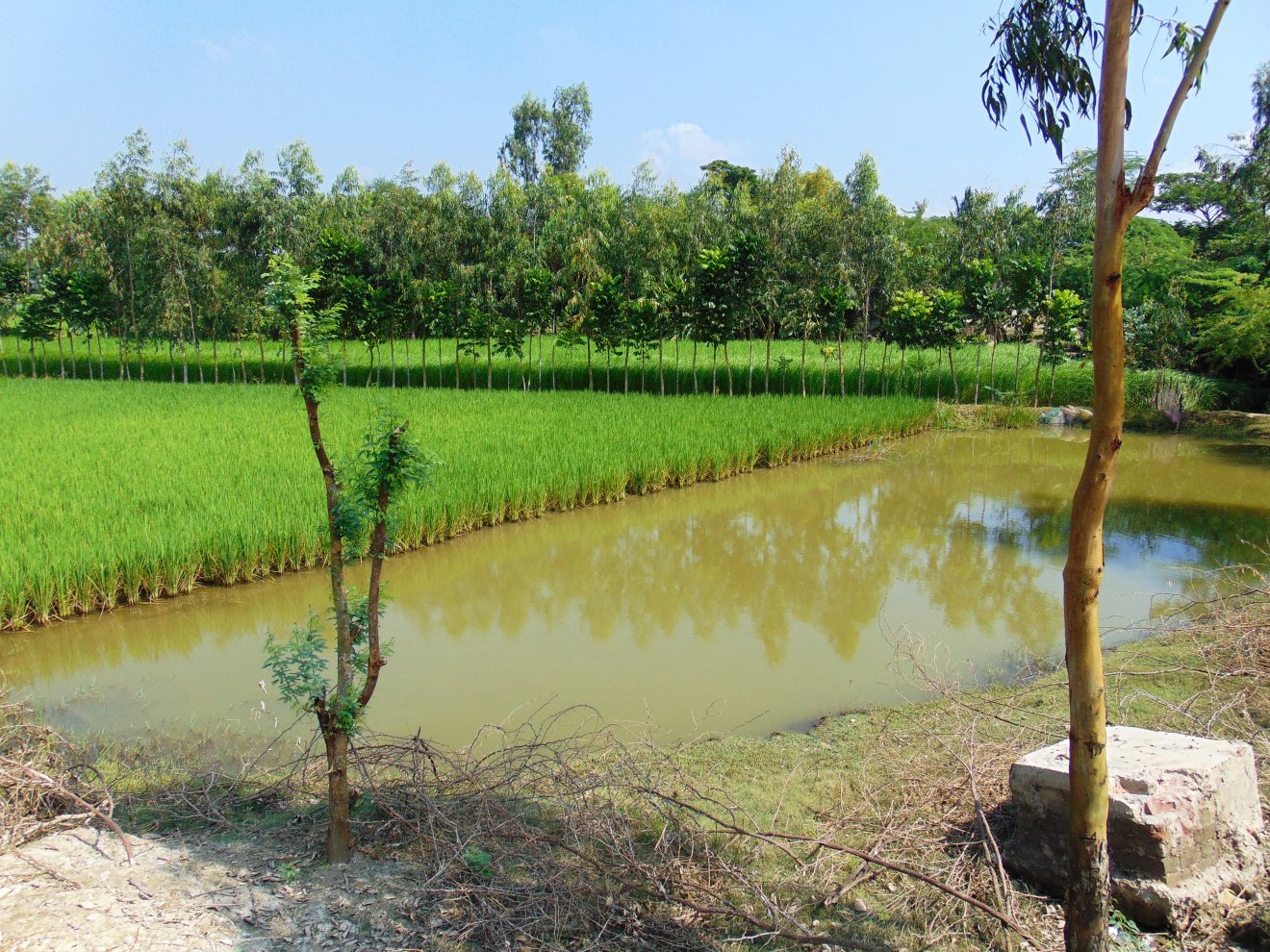|
|
| Dear IPSI members and friends, |
| Greetings from the IPSI Secretariat in Tokyo, Japan. IPSI and its members continue to stay active in a wide variety of projects and activities related to maintaining and revitalizing socio-ecological production landscapes and seascapes (SEPLS). |
| This month’s newsletter contains an update on the Eighth IPSI Global Conference (IPSI-8) and Expert Thematic Workshop planned for September and a report on an IPSI-related side event held at the High-Level Political Forum in New York. We also have announcements of a recent publication on the Satoyama Development Mechanism and the latest newsletter from the GEF-Satoyama Project, as well as a photo contest by Life Beyond Tourism. We are pleased to introduce one of IPSI's newest members, the School of Environmental Sciences at Jawaharlal Nehru University, and a recent case study from CORFOPAL in Colombia. |
| As always, we hope you will contact us to submit any new case studies or other information about your activities, or if you have any questions or comments. |
|
|
|
|
|
IPSI-8 and Expert Thematic Workshop on Landscape Approaches for the Post-2020 Global Biodiversity Framework
| As previously announced, the Eighth IPSI Global Conference (IPSI-8) will be held 2-3 September 2019 in Kumamoto, Japan. This time, the Global Conference will be held back-to-back with an Expert Thematic Workshop on Landscape Approaches for the Post-2020 Global Biodiversity Framework, which the IPSI Secretariat at UNU-IAS is organizing with the Secretariat of the Convention on Biological Diversity in coordination with the Ministry of the Environment of Japan and the Kumamoto Prefectural Government. |
| The Expert Thematic Workshop is intended to provide contributions to the ongoing series of regional and thematic consultations leading up to the development of the post-2020 global biodiversity framework, expected to be adopted at CBD COP 15 in late 2020. IPSI's experiences over the UN Decade on Biodiversity 2011-2020 have provided a wealth of evidence for the effectiveness of landscape approaches for biodiversity conservation, and this workshop will provide an opportunity for experts from within and beyond IPSI to consolidate and share ideas for how these approaches can contribute to biodiversity conservation in the future. IPSI-8 will cover operational matters at the General Assembly meeting, and there will also be a joint Public Forum for the two events. |
| For more details and registration information, please see the event page on the IPSI website here. |
|
|
|
|
|
 |
Side Event at High-Level Political Forum
| On 15 July 2019, a side event was held at the 2019 High-Level Political Forum on Sustainable Development (HLPF) in New York titled “Satoyama Initiative – Society in harmony with Nature: An Inclusive Approach for Communities on Landscapes and Seascapes”. The event shared lessons from the Satoyama Initiative, focusing on a community-based landscape approach for conserving ecosystems and biodiversity while promoting sustainable livelihoods, particularly as seen in the the Community Development and Knowledge Management for the Satoyama Initiative (COMDEKS) project, an IPSI collaborative activity administered by the United Nations Development Programme (UNDP). Participants concluded that the inclusive approach of the Satoyama Initiative together with initiatives such as COMDEKS could provide a firm basis for the implementation of the SDGs, the Strategic Plan for Biodiversity 2011–2020 and the Aichi Biodiversity Targets, as well as for the preparation of the Post-2020 Global Biodiversity Framework. |
| The event was organised by the IPSI Secretariat at UNU-IAS, the CBD Secretariat, UNDP, the Institute for Global Environmental Strategies (IGES), the Global Environment Facility's Small Grants Programme, and the governments of Bhutan, Costa Rica, and Japan. |
| For more information, please see the UNU-IAS website here. |
|
|
|
|
|
New publication: SDM progress evaluation
| For more information and to download the publication, please see the IGES website here. |
|
|
|
|
|
 |
GEF-Satoyama Project Newsletter
| The IPSI collaborative activity “Mainstreaming Biodiversity Conservation and Sustainable Management in Priority Socio-ecological Production Landscapes and Seascapes”, known as the “GEF-Satoyama Project” is an effort to “achieve societies in harmony with nature, with sustainable primary production sector based on traditional and modern wisdom, and making significant contributions to global targets for conservation of biological diversity” by working in targeted biodiversity hotspots around the world. The project is funded by the Global Environment Facility (GEF), implemented by Conservation International’s CI-GEF Project Agency and executed by Conservation International Japan in cooperation with the United Nations University Institute for the Advanced Study of Sustainability (UNU-IAS, the Secretariat of the International Partnership for the Satoyama Initiative) and Institute for Global Environmental Strategies (IGES). |
| The GEF-Satoyama Project recently produced its final quarterly newsletter, including updates from project components and reports of recent events. |
| The newsletter is available on the GEF-Satoyama Project website here. |
|
|
|
|
|
Partner Activities: Photo Contest by Life Beyond Tourism
| IPSI partner the International Institute Life Beyond Tourism at the Del Bianco Foundation is currently accepting submissions for its photo contest “Heritage for Planet Earth”, described as “part of a wider awareness-raising strategy – especially addressed to young generations – dedicated to the theme of fragility of heritage – cultural and natural – strongly linked to the planet Earth’s environmental equilibrium and climate change”, and aiming to contribute to the ‘transformation’ aspired for by the United Nations Post-2015 Agenda. |
| The contest will award ten prizes, as well as one Final Grand Prize. If you are interested, please look for updates on the Life Beyond Tourism webpage here. |
|
|
|
|
|
 |
New Member Introduction: School of Environmental Sciences, Jawaharlal Nehru University
| Founded in 1974, the School of Environmental Sciences is the starting point of higher education and research in the inter-disciplinary realms of Environmental Sciences in South Asia, supported by the national government. Admitting Indian as well as foreign nationals, the School has an international academic identity. Sponsored research and development programmes covering physical, chemical, geological, biological and cross-cutting themes such as climate change, biodiversity, pollution, socio-ecological systems and sustainable development implemented by the faculty strengthen the teaching programmes, feed scientific advancements in the policy-making process and translate science into on-the ground practices. The school has contributed to national communications to UNFCCC, recognition of the potential of below-ground biodiversity in sustainable landscape management, integration of indigenous and scientific knowledge systems, participatory, long term and adaptive community forest restoration and implementation of theme-specific national and international training programmes with support from UNESCO, the MacArthur Foundation, the United Nations University, the Tropical Soil Biology and Fertility Institute of CIAT, and the Global Environmental Facility. Landscape research is concentrated in highlands in two biodiversity hotspots, the Himalaya and Western Ghats and islands in the Sundarban UNESCO World Heritage site, and is planned for extension to the Indo-Gangetic plains, the “bread basket of South Asia”. |
| For more information, please see the School of Environmental Sciences website here. |
|
|
|
|
|
 |
Recent Case Study: Corporación Ambiental y Forestal del Pacífico (CORFOPAL)
| The IPSI Secretariat recently received a case study from partner organization Corporación Ambiental y Forestal del Pacífico (CORFOPAL), titled “Conservation on Private Lands Integrating Sustainable Production and Biodiversity in the Mid Dagua River Basin, Colombia”. |
| According to the case study, the main problem in the Mid Dagua River Basin (MDRB) is the loss of natural cover and ecosystem services associated with the Dagua River, due to agricultural expansion, planting of clean crops such as pineapple, and ranching. In response to this problem, CORFOPAL have worked with the community, with the objective of linking nature conservation to the enhancement of human well-being, by developing a participatory process of intervention favouring the improvement of the environment, sustainable production and the promotion of private conservation. This case study presents a summary of the conservation actions implemented in the MDRB, as well as the participatory management associated with the conversion of private land into natural reserves of civil society (NRCS) as a strategy to guarantee the sustainable conservation of natural resources. As a result, 13 NRCS and signed 20 conservation agreements with private landowners have been made, establishing a corridor that connects the territory in several aspects, links private landowners with protected areas, and contributes to the conservation of the biodiversity reported for the region (261 species of flora, 102 species of resident birds, 26 species of amphibians and reptiles and 27 species of mammals). In addition, there has been an improvement in community participation in conservation and environmentally-friendly activities. |
| For more information, please see the full write-up of the case study on the IPSI website. |
|
|
|
|
|
Contact
| Please be sure to let the Secretariat know if there are any changes in your e-mail address or contact information. |
Secretariat of the International Partnership for the Satoyama Initiative
5–53–70 Jingumae
Shibuya-ku, Tokyo 150-8925
Japan |
Tel: +81 3-5467-1212
Fax: +81 3-3499-2828 |
| If you have been forwarded this newsletter and would like to SUBSCRIBE, you can do so on the IPSI website here. |
|
|
|
|
|
|
|
|

